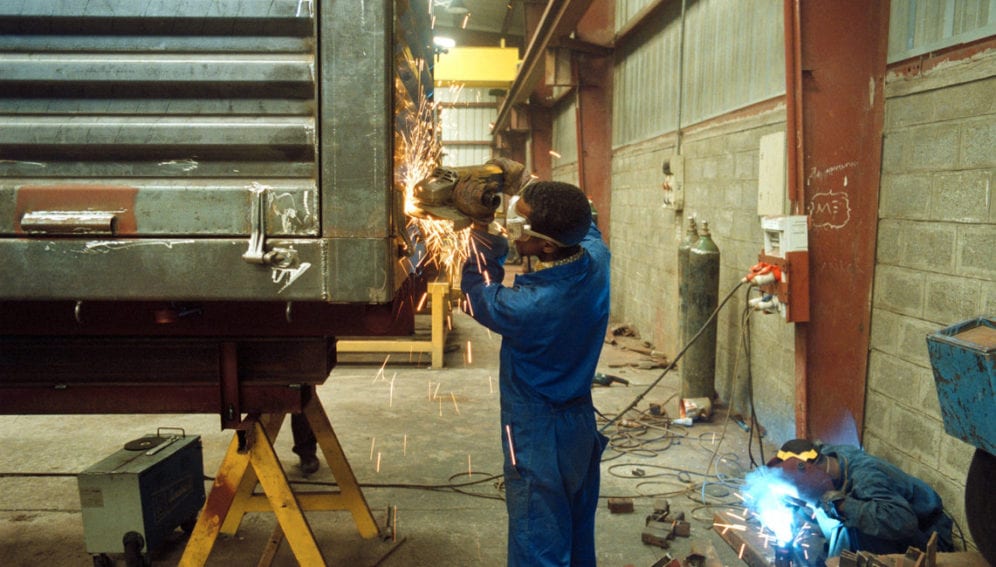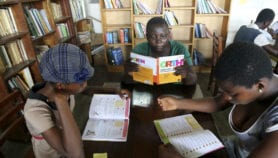By: Wilson Nyemba
Send to a friend
The details you provide on this page will not be used to send unsolicited email, and will not be sold to a 3rd party. See privacy policy.
Wilson Nyemba argues that engineering education could help Africa reduce foreign aid dependency and improve lives.
Standards of living have improved significantly in some parts of the world — especially in the developed world and some of the emerging economies — over the recent decades. However, in Sub-Saharan Africa, many ordinary people still lack access to water, power and healthcare. [1, 2]
Most people do not have access to electricity, forcing them to still rely on firewood for power. Many villages are inaccessible because of poor roads, and recent events have only highlighted the severity and impact of these problems.
Earlier this year, areas of Malawi, Mozambique and other countries in Southern Africa experienced heavy floods, leading to deaths and hundreds of thousands of people displaced. [3]
A lack of sufficient infrastructure meant that people struggled to leave areas of devastation, putting them more at risk of water-borne diseases. Emergency food and medicine couldn’t reach the affected areas quickly.
Better roads and bridges, power and water supplies may not prevent disasters such as this from occurring, but they would vastly improve people’s ability to cope and help lessen the resulting devastation.
Why lack of infrastructure?
Firstly, we don’t have enough engineers, and those we do have may not be sufficiently skilled. Data from UNESCO show that developed and industrialised countries have 20-50 scientists and engineers for a population of 10,000, while some African countries have fewer than one. [4]
“We don’t have enough engineers, and those we do have may not be sufficiently skilled.”
Wilson Nyemba, University of Zimbabwe
Engineers make the machines that manufacture medicines. They extract water from the source, distribute it and ensure it is clean and safe to drink. Engineers convert power, be it hydroelectric, thermal or nuclear and distribute it to the public, and are doing so in increasingly ‘green’ ways.
Engineers build the mobile technology and networks that allow us to communicate and share knowledge. They also design and make the vehicles and planes we travel in, and the roads we travel on. Alongside other experts, engineers are needed to improve our infrastructure, our standards of living, and reduce the threat of disasters.
Migration of skilled engineers from Sub-Saharan Africa to developed economies has also compounded the problem. For example, recession in Zimbabwe from 2000 led to brain drain, with many experienced professionals seeking work abroad. [5] Thus, most higher educational institutions have had to appoint freshly graduated engineers with little or no practical experience to train the country’s future engineers.
In addition, lack of investment in new technologies means most higher educational institutions must rely on outdated equipment to train their students. Because of this challenge, most young engineers lack the right skills and practical experience to improve the region’s self-sufficiency.
Policymakers have not made adequate investments in engineering. I’m sure many want to, but there is a lack of resources. Many countries in Sub-Saharan Africa rely on aid from developed economies, which is understandably focused on poverty alleviation and healthcare. For instance, aid often includes medicines and food, but much less long-term investments that will improve the self-sufficiency of countries in the region.
Improving the situation
Significant and sustained investment in engineering is a clear solution to improving facilities in our higher educational institutions, and ultimately the quality of future engineers. However, that is not currently a reality, or one that can be achieved soon. In the meantime, collaboration between academic institutions and industries can vastly improve the situation.
I have been leading a new programme, established by the Royal Academy of Engineering in the United Kingdom, and supported by the Anglo American Group Foundation, to help improve self-sufficiency by forming and strengthening relationships between universities and engineering companies in Sub-Saharan Africa.
Established in 2013, the Enriching Engineering Education Programme aims to improve the quality of teaching in higher education institutions and equip young engineers with the ability and experience to rectify technical problems so that industry doesn’t have to import labour for their needs.
“The Enriching Engineering Education Programme aims to improve the quality of teaching in higher education institutions and equip young engineers with the ability and experience to rectify technical problems so that industry doesn’t have to import labour for their needs.”
Wilson Nyemba, University of Zimbabwe
At ‘hub’ universities, the University of Zimbabwe and University of Dar-es-Salaam in Tanzania, the programme is centred on a combination of two-way secondments between staff at the universities and those working in local engineering firms.
Teaching staff get the chance to receive on-the-job’ training and use up-to-date equipment, while engineers from industry get the chance to attend refresher courses at higher educational institutions as well as interact with staff, and mentor students. These secondments benefit both parties by aligning the curriculum more closely to regional development priorities. The University of Zimbabwe has 60 academics and technicians participating in the programme. Also, around 50 participants are from industry.
Additionally, workshops are held with nine other higher educational institutions in Botswana, Kenya, Mozambique, Namibia and Uganda, to share and discuss the lessons learned from the secondments. These workshops enable all involved universities to hear from participants from academic institutions and industry, and consider how to implement positive change in their own institutions.
The programme also aims to tackle local challenges by encouraging participants to apply their new skills to projects that address water shortages and power outages, for instance. One such project, at the University of Zimbabwe, has allowed the campus to become self-sufficient in the provision of water, now independently sourcing enough water to operate, and bringing stability to campus life. The water system, made up boreholes, a reservoir and a pump station, has generated a total of 134,000 cubic metres since January 2014.
What’s next?
Following the successes achieved thus far, the teams from Zimbabwe and Tanzania in consultation with the UK-based Royal Academy of Engineering are now exploring ways in which the programme can be scaled up, this time with a focus on building capacity and forming permanent links with industry, while widening the reach to positively impact engineering education across the region.
Investment is needed in modern equipment and technology to keep up with the fast- developing trends the world over. It is only by collaborating with the developed world and improving industry ties that we can provide the workforce of tomorrow with the skills and equipment required to tackle the everyday challenges faced by people across the continent.
Skilled and well-equipped engineers can make a difference first through the development of local projects, improving access to water, power and health care, and eventually, with the improvement of nationwide infrastructure.
By upskilling engineers in Sub-Saharan Africa we can improve the lives of everyone in the region, and kick-start and support growth in other sectors through better and reliable infrastructure.
Wilson Nyemba is a the former dean of engineering at the University of Zimbabwe, who is currently on sabbatical at the University of Johannesburg, South Africa, pursuing research focussing on engineering skills development for capacity building and sustainability.
This article has been produced by SciDev.Net's Sub-Saharan Africa desk.
References
[1] United Nations. International decade for action: ‘water for life’ 2005-2015 (UN, 2015)
[2] Lowell Bryan and others Strengthening sub-Saharan Africa’s health systems: A practical approach (McKinsey & Company, June 2010)
[3] David Smith Malawi floods leave grim legacy of death, destruction and devastation (Guardian News and Media Limited, 30 January 2015)
[4] UNESCO Engineering: issues, challenges and opportunities for development (UNESCO, 2010)
[5] IRIN ZIMBABWE: focus on the extent of the brain drain (IRIN 23 July 2003)














